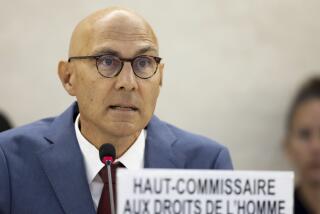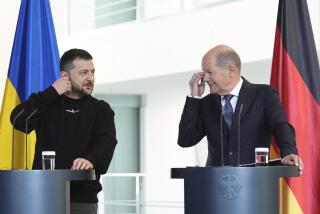Kohl, Visiting Russia, Subtly Backs Yeltsin
- Share via
MOSCOW — In a classic case of actions speaking louder than words, German Chancellor Helmut Kohl shored up the flagging fortunes of President Boris N. Yeltsin on Tuesday by snubbing Yeltsin’s Communist rival and reminding Russians that their future prosperity depends on good ties with the West.
Kohl deftly negotiated the political minefield of the race for the Russian presidency, staging his high-profile visit here less than a week after Yeltsin’s announcement that he will seek reelection but refraining from an outright endorsement that would be viewed as interference.
But with subtle allusions to more difficult days in East-West relations and praise for the reforms and reliability of Yeltsin, the German leader telegraphed the unmistakable message that his country and the rest of Europe hope the incumbent will win.
Kohl’s carefully executed strategy went straight for the pocketbook issues grabbing Russian attention.
He pointed out that 55% of Russia’s foreign trade is with Western Europe and that German investments are among the most influential in accelerating the nation’s economic transition.
It would be “idiotic” for the West to reduce aid to Russia, Kohl insisted. Before departing, he vowed during a news conference to expand cooperation and financing for further Russian-German joint ventures.
On political relations, Kohl noted, ties between Russia and Germany have long been a bellwether for peace and stability across the Continent.
“Russia is a major power and the most important neighbor to the east of our country,” Kohl said, assuaging Russians’ sensitivities over their perceived loss of superpower status. “We have a common history of many centuries marred by quite a number of dark pages that show Russian-German relations were always a test for the overall situation in Europe.”
Thorny issues such as the eastward expansion of the North Atlantic Treaty Organization and Bonn’s demands for repatriation of artworks looted from Germany at the end of World War II should be set aside for resolution in “calmer times,” after the election, Kohl said. He appeared to be trying to clear the campaign air of disputes that have given many Russians the impression that the West is still against them.
What riveted the attention of Russian media, though, was Kohl’s refusal to meet with Communist Party presidential contender Gennady A. Zyuganov, the front-runner and Yeltsin’s most likely opponent in the summer election.
Kohl shrugged off suggestions from Russian politicians and journalists that he should have talked with Zyuganov, hinting that to have done so would have interfered in a domestic electoral process.
“I will not speak about the chances of the candidates. That is an internal matter for Russians,” the chancellor said. “But I will clearly say that from the German and European point of view, continuation of the reforms, of the economic transition, of the cultural exchanges and the further opening of Russia to the rest of the world is of great importance to us.”
Any retreat to “old thinking” could alienate Russia from its European neighbors, Kohl said, invoking reformist code words for Communist-era ideology.
More to Read
Sign up for Essential California
The most important California stories and recommendations in your inbox every morning.
You may occasionally receive promotional content from the Los Angeles Times.














